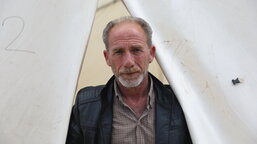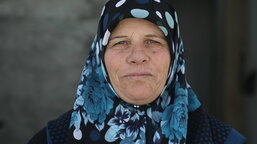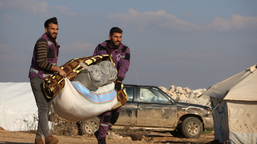When a devastating earthquake struck Turkey and Syria in the early hours of February 6 this year, it also affected the life of thirty-four-year-old Alaa. His house was severely damaged and Alaa lost the roof over his head in seconds. Yet he immediately started helping other people affected by the earthquake. In an interview, Alaa explains what it is like to work as a humanitarian in Syria, and what the immediate assistance looked like after the earthquake that took the lives of nearly 60,000 people.
19th of August marks the World Humanitarian Day. This year, we would like to dedicate this day to the humanitarians who tirelessly helped and continue to help after the devastating earthquake in Turkey and Syria, even though they were often affected by the earthquakes themselves, losing their own homes and loved ones. Alaa Aldeen Yahea is a colleague of ours who works as an area coordinator at our partner organisation Violet, with whom we are providing help to people affected by the earthquake.
How long have you been working as a humanitarian and how did you get into this work?
I have been working in the humanitarian field since 2012, driven by the sincere desire to help vulnerable people and families severely impacted by the war in Syria. This decision stemmed from the evident absence of institutional support in the areas where we reside.
You are currently working at Violet, an organisation that cooperates closely with Caritas Czech Republic to help people affected by the war and earthquake in northwestern Syria. How long have you been working at Violet and what is the scope of your work?
I have been a part of the Violet team for three years. I work as an Area coordinator, which means I am in charge of overseeing ongoing projects and activities related to Syrian youth and emergencies and disasters. I plan, supervise and manage these projects.
What does being a humanitarian worker mean to you? Why do you think this job is important?
For me, being a humanitarian means dedicating my life to making a positive impact on society. It allows me to provide crucial assistance to vulnerable people in Syria and work to improve their living conditions amidst the challenges they face.
As a humanitarian, you face many obstacles in your work, but you also encounter some nice moments. Can you describe what is the most challenging part of your work and what is the most rewarding?
The most challenging aspect of my job is grappling with the persisting bombings, constant crises the underlying causes of the tragedy. However, witnessing the satisfaction and gratitude of the people we help gives me great joy. I am happy to see the tangible, positive effects of our work which are immensely rewarding.
In February this year, a devastating earthquake of 7.8 on the Richter scale struck Turkey and northern Syria. Were you yourself affected by the earthquake?
Yes, I was personally affected by the earthquake, as both my house and the building I reside in were damaged.
As an aid worker, you were instantly involved in helping other people affected by the earthquake. What did the immediate humanitarian assistance look like?
In the aftermath of the earthquake, we promptly provided humanitarian aid to the affected people. We distributed food, water, but also hygiene kits and other essential non-food items. However, we encountered obstacles, primarily stemming from delays in aid and the unfortunate prioritisation of political considerations over humanitarian needs.
The first 72 hours after a disaster are said to be the most critical. How does the initial response look like and what is the most important thing to do when disaster strikes?
The most crucial initial response to a disaster is to ensure the availability of equipment in the affected regions to swiftly respond to emergencies. Community mobilisation with essential emergency supplies plays a vital role in effectively responding to such crises.
What is the situation in Syria now, six months after the catastrophic earthquake?
The impact of the earthquake is still evident across various regions and communities in Syria. The situation in northwestern Syria, where we operate, continues to be dire, with funding shortages and significant gaps across various sectors. The region’s ongoing vulnerability to attacks, bombings, and instability has been exacerbated by the earthquake, underscoring the urgent need for direct international attention and support.
What needs to be done now and in the future to help people in Syria?
To effectively assist people in Syria, efforts should focus on improving infrastructure and enhancing the capacity of local communities to respond to disasters more efficiently. Much more international attention needs to be focused on the plight of the people in Syria. To overcome the effects of the current conflict, emphasis must be placed on empowering local communities and enhancing living conditions in the region.
Thank you for the interview.
Help people affected by the earthquake in Turkey and Syria
In February 2023, a devastating earthquake struck Syria and Turkey, killing nearly 60,000 people. Millions of residents of the affected regions lost their homes. We have been working in the Turkish-Syrian border region since 2013. Thanks to this, we could start immediate assistance.
In the affected areas, we are working with our partner organisations to provide essential material assistance such as food, drinking water, hygiene items, warm clothing, and blankets. We also provide shelter and build social facilities.
We are able to help thanks to the generous support of donors who have contributed to the Caritas for Turkey and Syria fundraiser. Help with us.












